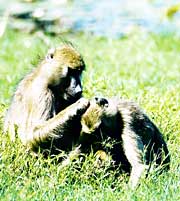What are friendships for?

A female baboon is grooming her sister's fur. A worthwhile investment
Female baboons who foster close social bonds with other females are much more successful in raising their offspring compared to less sociable mothers. This is according to a new study that provides support for the claim that primates, including humans, need a strong social network.
The study, published last Friday in the journal Science, reveals that the mortality rate of the offspring of female baboons who spent a lot of time cultivating social relationships was about a third lower than the offspring of more solitary females. "We don't know how sociability helps females, but we do know that sociable females are more successful in raising offspring," said Susan Alberts of Duke University who participated in the authoring of the study. "The conclusion is that social relationships are an important part of the existence of primates."
The researchers, led by Joan Silk from the University of California, Los Angeles, observed for 16 years 108 female baboons living at the foot of Mount Kilimanjaro in Kenya. They examined the social behavior patterns of the females and their effect on their functioning as mothers. In order to maintain social relations, baboons maintain physical proximity, groom each other's fur and form cohesive coalitions against outside threats.
"The females go to great lengths to maintain social ties," Silk said. "They invest 10% of their time in cultivating such relationships, more than any other animal in nature." The new study reveals that this investment pays off from an evolutionary point of view - it increases the survival chances of the offspring of the sociable females (most deaths of young baboons occur during the first year of their lives, and when a baboon reaches this age, researchers consider it a reproductive success). The research authors hypothesized that a social network within a group of baboons creates a safe environment for the offspring to grow: it protects them from predators and improves the attitude of the stronger members of the group towards the offspring.
According to Silk, this is the first finding in non-ape monkeys, indicating that a large investment in fostering social relationships can significantly improve the success of raising offspring. "There is a fascinating parallel in humans," she said. "We know that in humans, the existence of a social network has a very positive effect on health."
According to Silk, the finding that the existence of a social network helps baboons strengthens the claim that sociable primates, who are able to work cooperatively, have an evolutionary advantage over other primates. "Our findings and findings from human studies teach us that social contact is essential for survival as a primate," she said.
